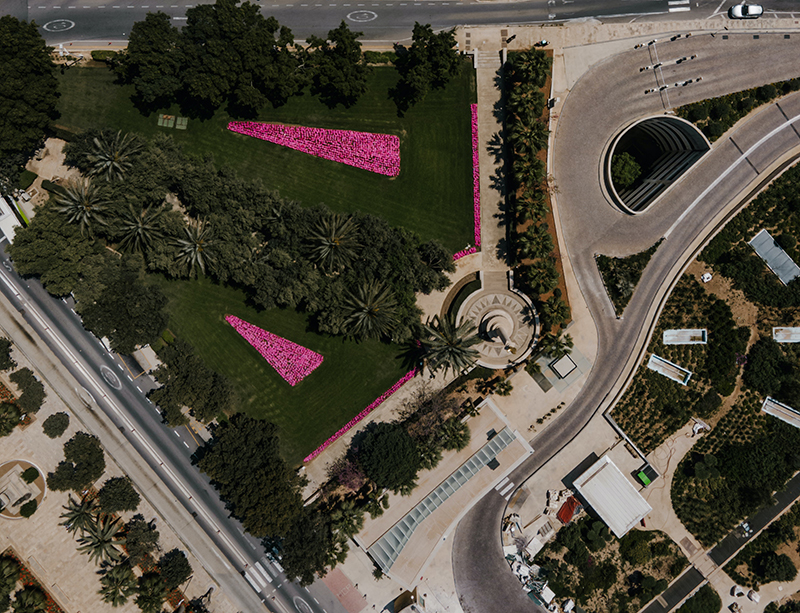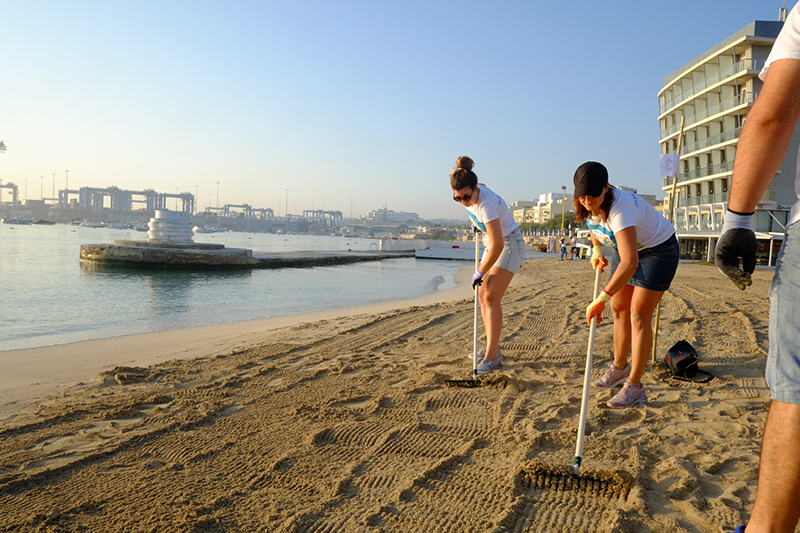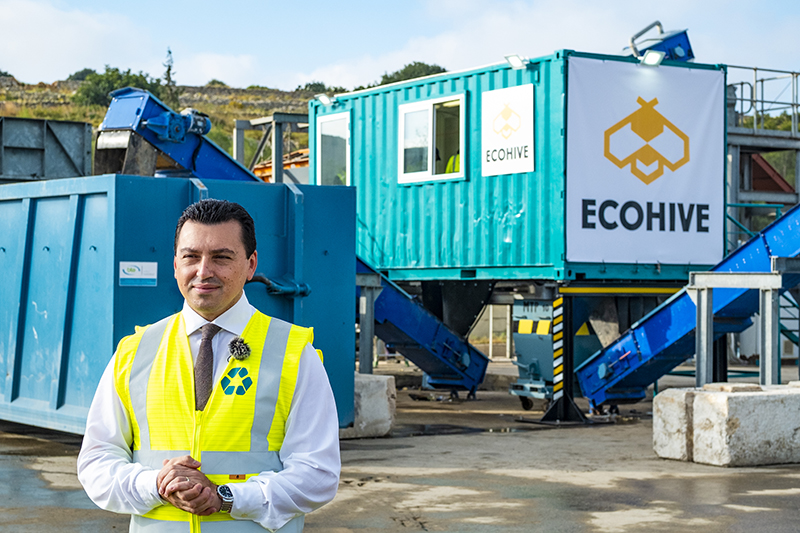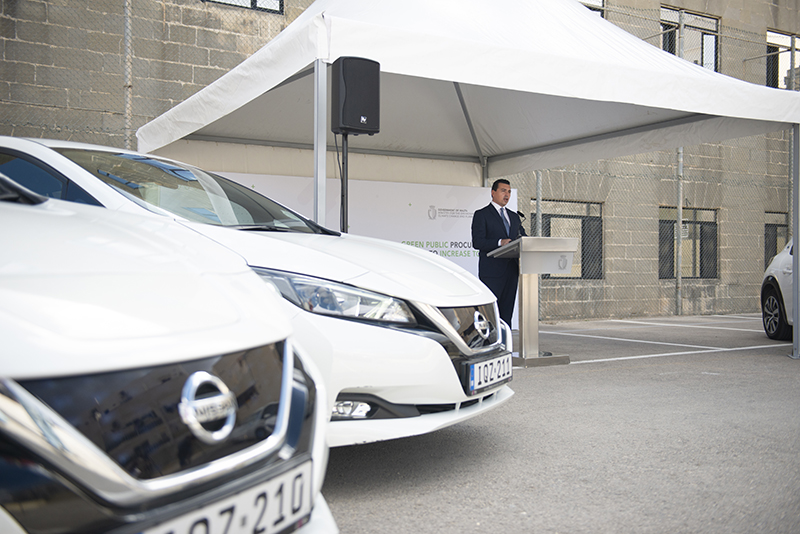Meet Hon. Minister Dr. Aaron Farrugia, Malta’s Minister for the Environment, Climate Change and Planning!
As our next contributor, we are honoured to introduce Hon. Minister Dr. Aaron Farrugia to the Green Deal Malta platform. In our exclusive interview with the Minister, Hon. Dr. Farrugia speaks about some of the main projects which the Ministry is currently working on in terms of the green transition, on a local level. Hon. Minister Farrugia also shares his thoughts on plastics and the circular economy, in the context of the European Green Deal. Find out more by looking at our exclusive interview with the Minister below!
Introduction to the Ministry for the Environment, Climate Change and Planning
Could you give us a brief overview of the work which the MECP does? What is the scope of the Ministry exactly?
As Minister, I am politically responsible for the pragmatic implementation of Government’s programme through policy formulation and application in the fields of the environment, climate change and planning in line with the EU acquis. Inter alia this also incorporates waste management, green public procurement, the building and construction sector including real estate licensing, development planning, urban planning, energy performance in buildings, building regulations, oversight of climate change actions, as well as the specific aspects of environmental policy such as biodiversity protection and restoration, natural capital, marine protected areas, seawater quality, Natura 2000 sites, air quality monitoring, air pollution control measures, ambient noise, urban greening, environmental projects as well as the circular economy dimension. This has entailed for example the development of such strategies as the Low Carbon Development Strategy, the Long-Term Renovation Strategy, the Near-Zero Carbon Buildings strategy, the National Bio-Diversity Strategy, The National Environment Strategy, the Construction and Demolition Waste Strategy, the Single-Use Plastics Strategy, the Waste Management Strategy, and the Green Public Procurement Strategy. All these sit on and along what is the largest body of EU directives and regulations and includes participation in the EU legislative process in the indicated areas, as well performing active roles in international conventions such as the United Nations Framework Convention on Climate Change, the UN Convention to Combat Desertification, UN Convention on Biological Diversity, the Basel Convention (on hazardous waste), the Stockholm Convention on Persistent Organic Pollutants, the Barcelona Convention, the Ramsar Convention on Wetlands and the Convention on International Trade in Endangered Species of Wild Fauna and Flora.
That’s quite a bite I should say and indeed the portfolio keeps us rather busy. I am grateful however to have the support of a very good team both at my office as well as at public administration level.
I should add that in the context of the EU acquis the thematic areas falling within my ministerial portfolio have in recent years become the underpinning principles that are guiding EU actions across all sectors. This is very well manifested in the European Green Deal project and even more concretely in the EU’s Fit for 55 Legislative Package that is aimed at integrating all policy actions across the EU and its member states with a view to achieving climate-related goals as well as protecting against biodiversity loss whilst ensuring green driven economic growth.
Are there any key projects or initiatives which the Ministry is currently working on in terms of the green transition? Could you give us some insight into such projects or initiatives?
The European Green Deal is the epitome of the green transition. It recognises that climate change, coupled with continued environmental degradation, is a veritable existential threat to humanity. The European Green Deal is a concerted body of policies and actions aimed at making the EU climate neutral by 2050, boosting economic growth through green technologies, and sustainable investments in all sectors.
The Low Carbon Development Strategy and the Long-Term Renovation Strategies are two of our main pillars of the green transition. These are a dynamic set of costed-actions that will enable Malta to reach its 2030 climate and energy efficiency targets, moving beyond to achieve climate neutrality by 2050. These include such countrywide initiatives as free public transport for all by Autumn next year, 65,000 private electric cars by 2030, incentives towards renewable energy projects at consumer and industrial level, building renovation grants, and also actions to re-energise our waste management sector. Here I am very proud to mention the unprecedented level of investment in waste management, a project we have fondly termed as the Eco-Hive Project. This project aims to mimic the critical role of bees in nature, in that that whilst being very active life-generating pollinators through foraging from flower to flower and plant to plant, they also transform the gathered nectar into pure delicious honey. Eco-Hive represents five major waste projects that will handle all waste generated on the Maltese islands, keeping our homes and workplaces clean, maximising waste recycling, generating energy from non-recyclable material and turning organic waste into agricultural compost whilst at the same time ensuring the reduction of greenhouse gases generation from waste management. The Eco-Hive Project is further complemented by other circular economy projects such as the Beverage Container Refund System, whereby private investment has been harnessed that will see about 300 reverse vending machines distributed in strategic locations across Malta and Gozo where empty beverage containers can be returned in exchange for a fee. These empty containers will then be recycled by the private investors in an effective example of circular economy practice. Our eyesight is now set on a circular economy initiative in the field of end-of life tyres but more information on that will be forthcoming in the near future.
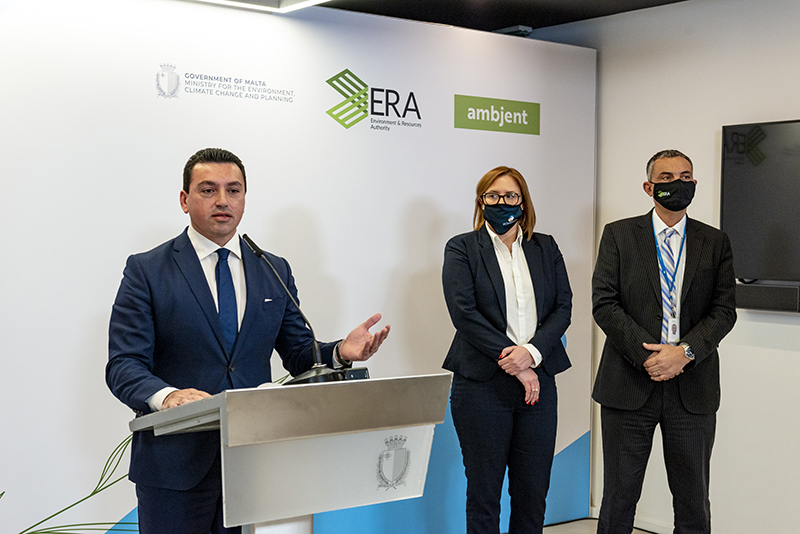
My Ministry is also supporting the green transition through several other projects and initiatives. Our Green Public Procurement Strategy ensures that as the largest consumer of products and services Government procures environmentally friendly products and services. For example as from 2022 any new passenger car that is purchased or leased by Government should be a zero-emission car.
Our green transition approach is a holistic one and therefore as from next January, the sale of single-use plastic items will be prohibited. Single-use plastics are major polluters and we aim to stop this. The Construction and Demolition Waste Strategy is geared towards the reduction of such waste generation and also to encourage the re-use of construction material and the introduction of alternative less polluting construction materials.
A number of urban greening projects and initiatives, such as the installation of various green walls as well as the embellishment and planting of trees and plants in a number of core urban areas are aimed at providing a much needed green lung to city areas as well as a biodiversity enrichment centre creating hub as well as ecological corridors to our more rural and natural environments outside urban peripheries. Another successful initiative was the Green Your Building Scheme for residents to green their facades. And yet another major greening project was the transformation of a large area at Wied Fulija Zurrieq, the size of 12 football pitches, from a former landfill to a green haven with a total of 43,000 trees and shrubs planted and becoming a safe recreational space with nest boxes installed along cliff edges to attract Scopoli’s Shearwater birds to nest there. We are currently working to finalise a similar conversion of il-Qortin landfill in Gozo.
I should add that education and awareness are also fundamental drivers of the green transition. We all need to change our production and consumption behaviours to more sustainable ones that avoid waste and respect the environment. Our Saving Our Blue campaigns together with ClimateOn were initiated to raise awareness about the damage caused by marine litter and the need for more responsible behaviour in both the waste sector and also climate emissions. These were all possible with the support of several stakeholders, environmental NGOs and volunteers in a number of clean-up campaigns. We can all do our part and these campaigns have helped us garner support.
On a more personal level, how did your interest in green initiatives first evolve?
The green agenda was something that interested me from the beginning since entering politics. In fact, it was something that many would pick up on even before I assumed my function as environment minister: in my previous cabinet role I often spoke of the circular economy and the importance of improving society’s wellbeing. Since becoming environment minister, the perspectives and interest on green initiatives have certainly matured. For the past three years I had the opportunity to further deepen my understanding and commitment on the critical environmental policy areas of the country. This is the reason why, I felt that it is important to fully engage in the promotion of key initiatives, that would undoubtedly improve the Maltese natural environment. It is indeed a unique experience to be part of change, starting from the daily mundane activities to those initiatives that really establish a way forward for a significant impact.
European Green Deal
What is the European Green Deal and why is it important?
The Green Deal is strategic in nature given that it sets the key priorities of the European Commission agenda with a long-term vision on a sustainable Europe. The legislative proposals that will be adopted at EU level in the next years will shape a new socio-economic process, in which climate change and environmental resilience are at the core of the proposed reforms. The Green Deal permits the EU to be the frontrunner on climate change and environmental action, with a view to turn Europe into the first climate neutral continent, by 2050. This ambition has been enshrined in the European Climate Law.
To ensure the implementation of this ambitious plan, it is pivotal that a number of policies concerning industrial production, trade, agricultural policies and competitiveness, just to mention a few, embrace sustainable principles and approaches. This is exactly what the European Commission is proposing through the adoption of new thematic strategies and new legislative proposals.
The importance of the Green Deal, therefore, lies in its function to catalyse our aspiration to promote sustainable economic models, benefitting from the sustainable use of natural resources, together with new investment and employment opportunities, without hindering our growth and prosperity.
This, therefore, is not only an opportunity to continue enshrining and mainstreaming climate action and policies in various sectors, but also address a long-term transformation of our society, embracing a just transition process, where no one is left behind, while fostering the well-being and health of our citizens and future generations.
Do you think the goal of reaching climate neutrality in Europe by 2050 is realistic? What do you think will be the main driving force to reach this target?
Achieving the climate neutrality goal is a commitment that all EU Member States, including Malta, have agreed to reach collectively. With the adoption of the EU Climate Law, we have embarked on a binding commitment towards reaching these goals.
Recent event this year undoubtedly show that we are already experiencing a climate crisis. The recently published IPCC Report from the United Nations states clearly that there is no more time to hesitate in front of climate change impacts. Expectations are being ramped up due to this urgency and concrete action is needed. Despite the difficult negotiations, the message from the recent COP26 in Glasgow is clear: we need to act urgently if we want to avoid irreversible impacts.
There are, indeed, challenges ahead, but there are also new opportunities in terms of investments and the creation of new jobs. This is the reason why the success for reaching this goal will be influenced by our capacity to undertake wise decisions and commitments today in planning the future that we want.
From a national perspective, Malta’s Low Carbon Development Strategy is key to ensure that our commitments are translated in clear actions. The Strategy identifies the policy measures which will shape the patterns to achieve carbon neutrality at the national level by 2050. This encapsulates different policy measures, which span across the main sectors from which GHG emissions remain high and therefore more actions are required. In this process we seek to promote alternatives offered by technological development, as well as instigating individual and collective behavioural changes towards sustainable practices, including mobility, energy consumption as well production processes, thus benefitting from the sustainable use of our natural resources.
How will the EU Green Deal improve the health and quality of life of European, and Maltese citizens?
The EU Green Deal will bring about sustainable changes in key economic sectors, including energy, industry, construction, and transport represent the gate for new form of investments that will improve our quality of life and well-being.
The EU Green Deal will lead to the adoption and implementation of regulatory reforms, which embrace sustainable and environmental principles and that will facilitate the integration of new sustainable economic models and reduce the generation of additional pollution sources, which all impact directly on our health.
Within this process, individual citizens choices and behavioural changes are also key component to shift towards sustainable patterns.
We reiterate the importance for us to continue pursuing investments towards sustainable mobility, including alternative modes of transport and incentivise the uptake of clean vehicles to reduce impacts on air quality levels and, in consequence, our health.
Likewise, we recognise the value of promoting a new model of growth which goes beyond the GDP and puts the quality of life at the centre of future investments.
This is also why we continue to invest in the regeneration of green urban areas and recreational parks, recognising the positive effects towards the health and well-being of our citizens.
How will the Green Deal ensure the protection of our environment and oceans?
The protection of our environment and oceans is undoubtfully a clear priority under the Green Deal. This has been reaffirmed by the EU Commission with the adoption of a new Biodiversity Strategy towards 2030 and a Zero Pollution Action Plan. These two strategic documents holistically address a new set of targets for the reduction of pollution in our air, land and sea, calling upon all EU Member States for a higher level of ambition and collective action.
The designation of new protected areas at land and sea, and the promotion of conservation and restoration of our nature, promote nature conservation with a view to urgently reverse biodiversity loss and natural degradation.
These will require a coordinated effort from all countries in the region. Indeed, pollution in the form of marine litter or transboundary air contamination simply cannot be stopped at borders.
In this case let me once again reaffirm that prevention through sustainable patterns can be one of the best options at our disposal in order to reverse the current patterns and trends. As a small island at the heart of the Mediterranean, we are highly exposed to transboundary pollution sources, but we also recognise that, despite our size, we can play a part in reducing pollution particularly along our coasts and sea.
As previously mentioned, we believe that by instigating our citizens to adopt and consume alternative and sustainable products we can positively impact the reduction of marine litter. This year, our third edition of “Saving Our Blue” has been instrumental not only to continuously raise awareness but also bring concrete results, with the collection of over 11,000 kg of waste as a result of various clean-ups.
What measures and initiatives are being taken by the Ministry to bring the EU Green Deal to Malta?
The Green Deal is certainly posing a new transformation process that goes beyond the action of one individual Ministry. It requires a coordinated and holistic approach across the Government.
From this end, we have been intensively working on a number of initiatives, strategies and national legislative reforms, which specifically aim at integrating and mainstreaming environment and climate change into long-term socio-economic development processes. From a strategic level, we are ensuring that the various long-term national strategies work in sync with each other, complementing actions towards the same objectives: reduce our GHG emissions and facilitate a green transition process. Examples are the LCDS, LTRS, the post-pandemic strategy and the Economic Vision.
The adoption of these new strategies sets the pathway that we wish to undertake in the coming years. With this in mind, we believe that the engagement of citizens, in particular the younger generation, can be pivotal in addressing our aspirations to see the Green Deal objectives fully implemented in our country.
Plastics and Circular Economy
How does the Ministry engage citizens and companies in the shift towards more sustainable practices?
For the past years, we have been advocating the importance of shifting our economy towards sustainable consumption patterns through numerous initiatives. We have launched communication campaigns, promote sharing of best practices and experiences, as well as adopting regulatory reforms and policy instruments. The message is two-pronged. On the one hand, we see the importance of reducing our waste generation, by promoting the re-use and recycle of resources, products, and materials already at our disposal, thus embracing the principle of circularity of material.
On the other hand, we see the engagement of local businesses as crucial to open up market barriers and to provide alternative products to consumers. This will in turn provide opportunities for new investment models, the identification and creation of green jobs, whilst reducing impact on natural resources.
We see this as part of a line of action that we have also undertaken towards single-use plastic, through the adoption of regulatory reforms. We are phasing out the placement on the market and use of certain products, while supporting the market through grant schemes to incentivize more sustainable material in the market. This is a transition process for which we see additional benefits deriving from the reduction of waste generation as well direct impacts towards our coasts and surrounding water caused by marine litter.
In this process, we see the value of continuously engaging and sensitising our citizens in the adoption of sustainable alternative products, shifting their consumption patterns.
What role will communities play in the conversation about the circular economy?
Communities, including business operators are critical to achieve our goals. Our initiatives aim to consolidate dialogue with all key stakeholders involved in the process, recognising that behavioural change from consumers is ultimately a key component. Change can be facilitated when citizens and local communities are directly involved, therefore adopting a community-based approach, in which different realities are taken into consideration and opportunities rather than threats are better outlined. It is in this spirit, that we see the importance of engaging consumer and business operators.
What role will bioplastics and other bio-based materials play in the shift away from non-renewable materials for packaging and products?
I must, first and foremost insist that the best environmental option advocated is to minimize waste to the unavoidable irrespective of the material. Reusable options do not contribute to waste generation but in lower levels than single-use plastics and that is why is the focus of our policies is on those plastic items that are intended for singular consumption and not long-lasting. It is important to recognise the role of market innovation, which we are seeing as important for the identification of potential sustainable alternatives including compostable material.
What are the most important components of a circular economy in your opinion?
When looking towards the end-of-life cycle of products, it is important that we continue first encouraging and facilitate prevention, reuse, and repair of goods, avoiding the unnecessary creation of waste. Waste separation and recycling are the best practice when it comes to handling the waste generated. And we are investing half a billion euros in a complex of waste management facilities to ensure that we improve the effectiveness and move towards a circular economy.
Though admittedly limited, opportunities in Malta for increasing the circularity of certain waste streams exist. As part of our holistic policy approach, the Waste Management Plan 2021-2030 identifies additional products, through which circularity is being carefully assessed.
There is also an opportunity to revalue construction and demolition waste products, for which we aim at implementing circularity principles and practices, including re-use and recycling of material, through an ad hoc Strategy recently adopted. This will ensure that also for this important economic sector, sustainability principles will be fully integrated in the process, minimising waste generation but also upskilling and re-skilling local operators.
If the logic of the circular economy is so compelling, what is the reason as to why more companies aren’t implementing it already in their processes? What do you view as the main challenges in this regard?
Small size leading to diseconomies of scale tend to affect the opportunities to embed circularity in the economy, considering the immediate higher costs. Taking the construction sector as an example, where the potential is significant, barriers such as research and innovation, market penetrability, feasibility of reconstituted elements and acceptance of new materials need to continue to be addressed.
With this said, however, we aim to facilitate a business environment, with Circular Economy Malta, which has been enacted to further explore and address such circumstances as well positive opportunities and alternatives in this process.
In your opinion, how can private companies participate or contribute to making Malta more sustainable?
The private sector as with local communities has an extensive role to play in each aspect of sustainability. As in the past years, the Government remains committed to continue supporting local companies towards the adoption of environmental and climate-resilient practices. For instance, we see the value of effective schemes and incentives, which address the uptake of energy efficiency and the deployment of low carbon and green technologies, reducing GHG emission impact. Through the “green corners” initiative, for another example, we see how local operators contribute towards the reduction of packaging material, resulting in reducing impacts on waste streams.
On a longer-term, we see that the uptake and deployment of new technologies such as PVs and renewables, as well electric vehicles, will provide an opportunity for private operators to provide new forms of services and products. This will further increase the number of green jobs, through effective re-skilling and up-skilling of our society, opening up to innovative forms of investments.
Concluding remarks
Where would you like to see Malta in the coming 10-15 years?
This is certainly a turning point for our country. for Today we are setting the basis for a long-term sustainable and transition to a low carbon development process. This certainly requires that each and every citizen is fully engaged and actively contribute in becoming part of this change.
I believe that for the next 10-15 years we can all aspire to see our country embracing the transformation processes, implementing what today is being drawn and described in our national strategies. I see this as an opportunity for our country to open up to new forms of investments, particularly in research, innovation and technological and digital developments, with a view to improve the quality of our life, whilst reducing our carbon footprint.
Do you have any concluding remarks or messages which you would like to share with the Green Deal Malta community?
The transition towards an environmental and climate-resilient process remains a long-term journey that has been carefully planned in our relevant national strategies and action plans. The success of integrating the objectives of the Green Deal in our national policies will require the full engagement of local stakeholders, including business communities, civil society, and individual citizens, as well international investors.
Today, we aim at setting the basis through which we can continue promoting local and international investments, with a view to explore and adopt new technologies and business models, which are in line with the sustainability principles and objectives of the Green Deal. As Minister responsible for the environment and climate change, I encourage our citizens to continue engaging in this process, by adopting sustainable practices, contributing to safeguard our environmental resources and strengthen our climate resilience.
Contributor(s)

Hon. Aaron Farrugia
Hon. Aaron Farrugia is Malta’s Minister for the Environment, Climate Change and Planning. Previously, Farrugia served as Parliamentary Secretary for European funds and Social Dialogue at the Ministry for European Affairs and Equality. Farrugia was elected to the House of Representatives of Malta in June, 2017. He is a member of the Foreign Affairs Committee and Head of the Maltese Delegation in the Parliamentary Assembly for the Mediterranean. Honourable Farrugia has previously served as Deputy Mayor of Ta’ Xbiex, Chairman of the Malta Labour Party’s progressive think-tank IDEAT, Chairman of the Labour Youth Forum, Education Secretary and Member of both the Administration and the National Executive Committee of the Partit Laburista.
As an economist, Farrugia worked as an Advisor to the Maltese Delegation in the Committee of the Regions and later on as the Chief Executive Officer of the Malta Freeport Corporation. He graduated with an Honours Degree in Finance at the University of Malta in 2002, read a Master of Arts degree in European Politics, Economics and Law in 2005.
He graduated as Bachelor of Laws L.L.B. in 2011 and obtained a Doctor of Laws in 2013. Aaron Farrugia was a visiting lecturer at the Faculty of Economics, Management and Accountancy of the University of Malta, teaching Politics, Political Campaigning, Policies and Governance. Aaron is an alumnus of the U.S. International Visitor Leadership Programme (IVLP, 2012), and was selected as a 40under40 European Young Leader by Friends of Europe in 2017. He is married to Charmaine Farrugia and have two daughers, Petra, born in 2012 and Angelica, born in 2018.

